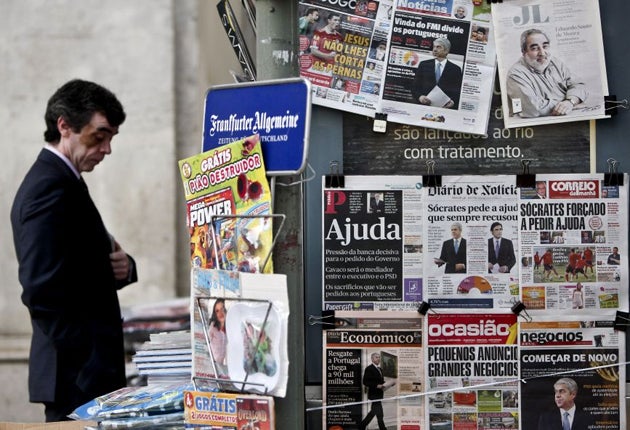Portugal sombre in face of bailout as Germany weighs cost of rescue
Stricken government warns nation to expect tough times, while Berlin signals rescue may be conditional on reform

European finance ministers will today start several weeks of wrangling over Portugal's €80bn bailout with Germany demanding reforms as the price for rescuing the ailing economy.
Berlin said the aid could only be granted as part of a reform programme, which could take two to three weeks to put together, and which it sees as the only way to prevent such crises from recurring. The mood in Portugal was sombre yesterday with officials warning of tough times ahead following the announcement by its prime minister, Jose Socrates, that the government had given up on its year-long attempt to solve its financial problems and was seeking a bailout from the IMF and its eurozone partners to prevent a default on its debt.
The size of the bailout is likely to be between €75bn and €85bn, about the same size as the Irish package last year, but some way smaller than the €110bn Greek rescue last May. The issue is to be discussed by European finance ministers at a meeting in Hungary today.
If the Portuguese government baulks at the terms offered, or if the new parliament elected on 5 June rejects the package then Portugal and the whole eurozone will be plunged into chaos yet again.
Portugal struggled to digest the expected-yet-dreaded news of the bailout bemoaning missed opportunities and bracing itself for even tougher times ahead. "April 6, 2011, will be recorded in Portugal's history as a sad day, a very sad day," said an editorial in the Jornal de Noticias newspaper said. "Yesterday, our country succumbed not only to the pressure of the hated markets but to itself."
The eurozone's bailout fund can cope with the scale of Portugal's problems but there were fears that the debt contagion could spread to Spain. Its neighbour yesterday fended off speculation that it could go the same way.
"The risk of contagion is absolutely ruled out," said Spanish Economy Minister Elena Salgado. "The markets have long known that our economy is much more competitive."
The markets seem to have agreed, and a €4.1bn sale of Spanish government debt went successfully, without imposing punitive interest charges on Madrid. But making life even more difficult for indebted European governments, banks and households alike, the European Central Bank chose yesterday to raise interest rates for the first time since the recession began in 2008.
The hike, from 1 to 1.25 per cent was long signalled by the president of the ECB, Jean-Claude Trichet, and the expected announcement helped keep the euro steady in international markets. Shares across Europe were also left broadly unaffected by the news, which, like the Portuguese rescue, has been expected for many weeks, if not months.
Despite the expectation that a bailout was inevitable, the Portuguese Foreign Minister, Luis Amado, summed up the funereal mood in his country, expressing his "sadness and resignation" about a "situation that could and should have been avoided".
"The reality has been greater than our convictions," he said.
Miguel Beleza, the former Portuguese finance minister and former governor of the Bank of Portugal, also predicted that foreign aid would bring the country "a long period of difficulties" and called for "patience" on the part of the Portuguese people.
"With climbing interest rates and the downward spiral of the ratings, Portugal was entering a vicious cycle with an obvious exit, and I think we should have taken that exit sooner," he said.
Trade union leaders vowed, however, that future belt-tightening would not be as painful as it has been in Greece and Ireland. "Greece and Ireland have more developed economies than ours, and the minimum wages are higher," said Bettencourt Picano, president of the Union of Technical Staff. "We hope that that difference means measures will not have to be as drastic or dramatic."
Some factions, however, called the bailout "illegitimate". Communist Party leader Vasco Cardoso said the decision to seek an EU rescue package should not have been made by a caretaker government before the 5 June elections.
Subscribe to Independent Premium to bookmark this article
Want to bookmark your favourite articles and stories to read or reference later? Start your Independent Premium subscription today.

Join our commenting forum
Join thought-provoking conversations, follow other Independent readers and see their replies